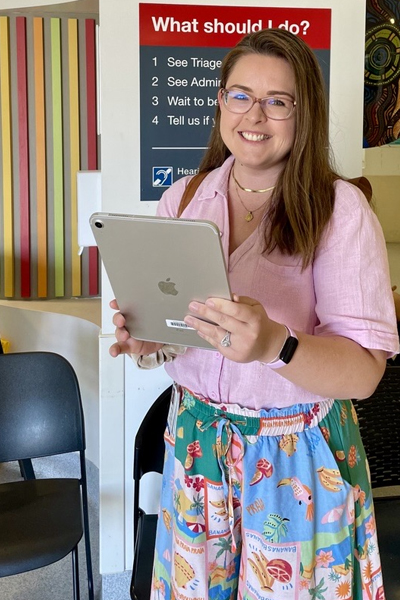On-demand video interpreter service reducing barriers to healthcare

Metro North Health Senior Multicultural Health Officer Madi Hope is launching a new 24/7 on-demand video and phone interpreting service in The Prince Charles Hospital adult Emergency Department.
A new, on-demand video interpreter service will provide essential communication support for patients at a time when they need it most.
The Prince Charles Hospital is the first hospital in Queensland to trial a new 24/7 on-demand video and phone interpreting service in its adult Emergency Department.
It is being offered by a Queensland company with all interpreters holding industry-standard National Accreditation Authority for Translators and Interpreters (NAATI) certification in their language.
Metro North Health Senior Multicultural Officer Madi Hope said the trial was expected to provide almost immediate access to an interpreter for patients presenting at the Emergency Department, 24 hours a day, seven days a week, using an iPad app.
“A similar trial interstate returned average wait time for patients to access an interpreter for all languages via video or phone of just 36 seconds,” Madi said.
“Common languages including Arabic, Mandarin, Cantonese, AUSLAN, Korean and Spanish have an average connection time of just 20 seconds, avoiding previous long waits up to several hours.
“We are confident this trial will reduce communication errors and provide better patient care and outcomes at The Prince Charles Hospital.”
Madi said providing in-language care and information upon arrival at triage and during treatment was essential to reducing barriers to navigating and engaging in healthcare and risks to patient safety.
“There are more than 200 different languages spoken in Queensland and one in five people in Metro North speak a language other than English,” Madi said.
“Emergency settings present an additional risk to accessing an interpreter for non-English-speaking patients, due to the urgent and 24/7 nature of presentations.
“It is also logistically difficult to include an interpreter in-person in an emergency care setting due to space limitations, infection control risks, and the busy nature of the environment.
“This exciting new trial will allow staff to communicate more effectively and provide better care to patients from multicultural backgrounds at the touch of a button.”
If a video connection has not been established after 20 seconds, the app offers to transfer to a phone call instead of a video call. This increases the pool of interpreters and will likely guarantee an almost instant connection.
